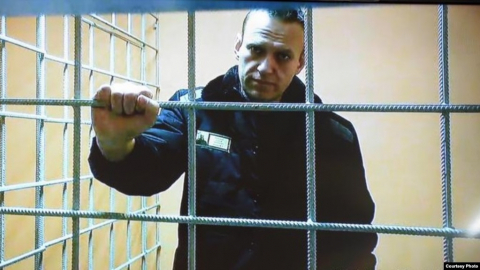Russian anarchists on Navalny’s death: Solidarity zone
Submitted by Редакция on 2 March, 2024 - 03:18
Late last year, opposition politician Alexei Navalny, who had been sentenced to 19 years in prison for a number of trumped-up cases, was sent to a special regime penal colony in the settlement of Kharp in the Far North, one of the most hard-to-reach colonies. This region colonies are famous for its harsh regime and torture of prisoners. In addition to Penal Colony 3, "Polar Wolf", where Navalny was taken, the region is also known for the torture and murdering of prisoners in the "Polar Owl" colony, for those sentenced to life imprisonment, and high-security Penal Colony 8, where political prisoner Oleg Sentsov, for example, has described the torture that’s taking place.
On 17th of Febrary the family of Alexei Navalny received official notification of the political prisoner’s death in Penal Colony 3.
Whatever causes are eventually established for Alexei Navalny's death, what took place was a murder. The Russian authorities had already tried to kill the politician in 2020 with Novichok poison. In the colonies, Navalny was constantly kept in a SHIZO, in isolation from other convicts, and the politician's lawyers were arrested on charges of participation in an "extremist community". Finally, the political prisoner was sent to a geographical location that is impossible to reach quickly. All of these planned actions were aimed at minimising Navalny's political influence. Even if his death was due to "natural causes", the conditions in which this was possible were created by the Russian state.
It is important to note that Alexei Navalny is far from the first prisoner killed in a Russian prison. Here are a few examples.
Previously, the most famous such case in Russia's recent history was the death in a Moscow pre-trial detention centre in 2009 of Sergei Magnitsky, an auditor for an international consulting company, who alleged the existence of schemes for large-scale embezzlement of budget funds by Russian officials and law enforcers. The authorities prevented the public from being able to establish the exact circumstances of the death. However, it is reliably known that Sergei complained about the lack of medical care, and on the day of his death, eight (!) jailers escorted him to a separate cell, where he died.
On 13 September 2016, Valery Zakharkin, who had caused the Federal Penitentiary Service great inconvenience with complaints and appeals to the ECHR, was murdered in “Polar Owl”. On the instructions of operative Igor Nesterenko, he was beaten to death by "squeezers" Alexei Voevodin (a well-known neo-Nazi) and Alexander Ageyev.
In February 2018, in St. Petersburg Pre-Trial Detention Centre 5, after torturing and raping him, unknown law enforcement officers killed businessman Valery Pshenichny, who was accused of embezzling money from the Ministry of Defence.
Last year, Crimean Tatar political prisoner Dzhemil Gafarov, who had previously complained about a lack of medical care, died in the Novocherkassk pre-trial detention centre.
One can argue endlessly about the causes of these deaths and murders and their beneficiaries, but one thing is certain. Unless a murder is authorised by the top thugs in the Kremlin and Lubyanka (headquarters of the FSB), public attention and human rights support can save a prisoner’s life. No head of a pre-trial detention centre or colony would want to kill a prisoner, knowing that afterwards they would be subjected to several years of scrutiny, with the media writing about their involvement in the murder.
That is why it is very important:
- to disseminate information about political prisoners,
- to write letters to political prisoners — this shows the administration how many people are following the fate of a particular prisoner,
- to support fundraising for lawyers’ fees.
The Russian state tortures and kills. We cannot raise the dead, but it is in our power to make it as difficult as possible to torture and kill the living. Support political prisoners, and initiatives that defend them.
Until all are free!
